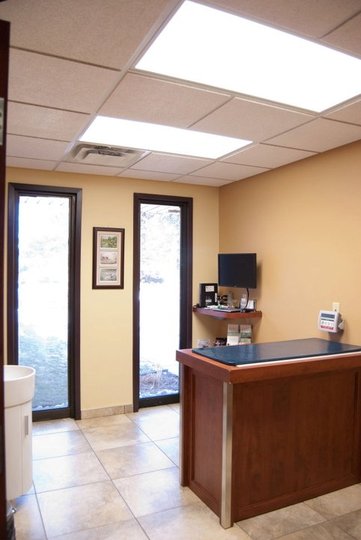
One of the best ways to keep your pet healthy is to have regular physical exams!
Since your pet can’t talk, you don’t always know when it’s not feeling well. In fact, cats and dogs tend to hide health problems. This is an animal’s natural instinct to protect themselves in the wild from predators that tend to prey on the sick or the infirm. And, remember, your pet ages an average of 7 years for every 1 human year! This means your pet’s health can change a great deal over the course of even a few months, which is why many pet owners choose to have a physical examination done every six months.
During your pet’s physical examination, the veterinarian will listen, look and feel for any subtle changes in their physical health. Starting at the head, the veterinarian examines the eyes, ears, face, and mouth. Examining the teeth is especially important since up to eighty-five percent of all dogs and cats over three years of age have some degree of periodontal disease. Early detection of periodontal disease is important, not only for effective treatment, but also future prevention.
The veterinarian will then examine your pet’s coat, looking for signs of parasites (such as fleas), and ensuring that the coat is not too dry or too oily, which may indicate a dietary imbalance. The veterinarian will also check your pet’s weight. If your pet is too heavy, a change in diet may be required to avoid health problems related to obesity. If your pet is losing weight over time, that could be a sign that your pet has a related medical problem which needs further examination.
During the physical examination, a stethoscope will be used to listen to the heart and lungs for abnormal sounds which may indicate disease of these organs. The abdomen will be palpated, allowing evaluation of the intestines, bladder, spleen, and kidneys in some cases. The veterinarian will examine your pet’s coat and palpate for any abnormal lumps or bumps, hair loss, itchiness, or discomfort. They will evaluate your pet’s muscle mass and body condition. Depending on the findings, they may perform further examinations to assess specific body systems such as neurologic, cardiac, ophthalmic, orthopedic, or other examinations.
Vaccinations for Your Pet
Vaccination is all about prevention!
Vaccinations are given to help protect your pet from a number of potentially serious and possibly fatal diseases. Vaccines are designed to give an individual’s immune system a memory. If our white cells remember an invader like a virus or a bacteria, the chances of that organism causing trouble in the future is greatly reduced. Not only that, vaccinations cost considerably less than the treatments available for the diseases pets are normally vaccinated against. Every pet should be vaccinated – even indoor dogs and cats can be exposed to a rabid bat!
Your veterinarian can discuss a vaccination program with you specifically tailored to your pet’s lifestyle.
